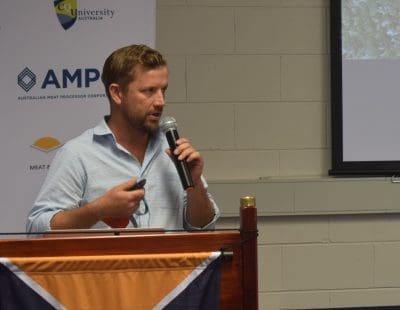There is a serious need to review and modernise the Australian cattle industry’s emissions targets to prevent cattle from being incorrectly “lumped in” with one-way fossil fuel emitters, Cattle Australia deputy chair Adam Coffey told last week’s ICMJ Northern Conference in Rockhampton.
Cattle Australia, the peak industry body for Australia’s grassfed cattle industry, is currently working to develop an industry road map that will clearly articulate where the Australian cattle industry is planning to head in relation to sustainability measures, including emissions targets, he said.
“We’re seeking better recognition of the cyclical nature of our emissions,” Mr Coffey told the conference.
“At the moment at a Government level, international level, even at the industry level with our current targets (such as CN30), we are measuring ourselves as a one-way emitter, and so we’re lumped in there with energy, transport, fossil fuel emitters.”
This was despite there being recognition from independent scientists that current greenhouse gas accounting systems overstate the warming potential of short-lived climate gases such as methane emissions from stable herds of cattle by 300 to 400 percent.
“It is really time to seriously review and modernise our industry emissions targets because nobody else is going to do this for us,” he said.
“Government and other sectors are very happy to continue to regard us as a big problem that has to be dealt with.”
He also pointed to several key developments that show emissions accounting systems either in place or coming that are set to directly impact the Australian cattle industry.
The Labor Government is introducing its flagship industrial carbon reduction scheme, known as the National Energy and Greenhouse Reporting Act, which will require mandatory reporting of emissions over 100,000t, which is likely to include larger pastoral companies.
The Global Methane Pledge is a commitment for signatories, which now includes Australia, to achieve an absolute reduction in methane emissions by 30 percent.
Public demands on companies, including downstream users of Australian beef, to report Scope 3 emissions in future are also mounting.
He said Cattle Australia has determined that it is a time to pause, take stock and evaluate what is needed to ensure the Australian cattle industry is operating in a fair and level playing field.
He said the cattle industry is unique in its ability to sequester large amounts of carbon and should be recognised as a solution provider to government and other sectors to help them achieve their net zero aspirations.
“We’ve done a lot and will continue to do so, but we’re not jumping at targets again until we clearly understand our net position,” he told Beef Central.

